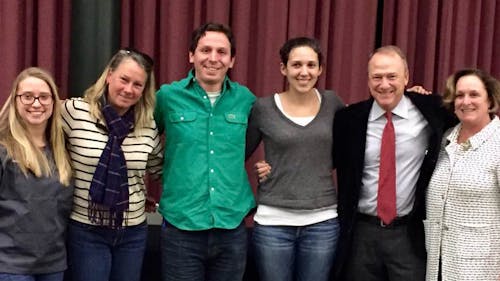Rutgers club helps students prepare for veterinary school

Applying to veterinary school is a daunting task, but Rutgers students who are planning on doing so have helpful resources through the Veterinary Science Club.
Nicole Meddaugh, a School of Arts and Sciences junior and the activities coordinator of the Veterinary Science Club, said that there are only about 30 veterinary schools in the country, with none in New Jersey. This makes applications particularly competitive for New Jersey students.
“The thing about vet school is they take a lot of in-state students,” Meddaugh said. “A class size is on average 100, and they'll take 80 in-state and 20 out-of-state. So coming from New Jersey, you're already at a disadvantage to every school you're applying to since you don't have an in-state school.”
The president of the club, School of Environmental and Biological Sciences senior Myke Yee, said that the majority of the club's members are on the pre-vet track of the animals sciences major. Others are planning to pursue a PhD in the field. The club also has members who have not committed to the field but have joined to learn more about it.
Yee said that about 30 Rutgers seniors apply to veterinary school each year.
“We try to prepare students as best we can to look good for vet school,” Yee said. “There are some fun events — we go to farms to look at alpacas. That's fun, but it is still preparing you for the veterinary field.”
The club typically takes three trips per semester to farms, zoos or veterinary offices. On some of the trips to local veterinary practices, the club participates in mock lab sessions in which they gain hands-on experience by dissecting animal limbs or they may watch a necropsy, which is an autopsy of an animal.
But most club meetings are less eventful than that, Yee said. The club's usual activities include trivia games and lessons on technical skills. Banana sutures are a common practice lesson, in which they learn suture technique by making a cut in a banana peel and then stitching it closed.
Because the primary purpose of the club is to prepare students for veterinary school, many club meetings feature a guest speaker, Yee said. This may be a vet, who will speak about how he or she navigated the challenges of applying to veterinary school and establishing a career, or it may be a veterinary school admissions officer, who can provide insight into the admissions process.
Yee said that the club officially has 108 members, but that meetings normally have about 30 to 40 attendees. Most of the members are first-years and sophomores.
“Unless you're on the executive board, you don't stay with the club,” Yee said. “You gather a lot of knowledge, and then you don't need to show up to the meetings.”
School of Arts and Sciences junior and vice president of the club Jennifer Nary said for the underclassmen club members, the older students they meet through the club are a resource at least as valuable as any other the club provides.
“Because there are upperclassmen who have been through it, (the club) helps with finding out how to get involved on the farm and how to get into research, which is really important for vet school too,” Nary said.
Caroline Pawlowski, a School of Environmental and Biological Sciences junior and treasurer of the club, said they foster community among pre-vet students. Upperclassmen are a valuable source of advice on which classes to take and how to apply for vet school.
Strong support of the club from the Department of Animal Science's faculty means that members also have a chance to get to know professors, she said.
“It can be kind of an overwhelming major if you're pre-vet because they're like, 'OK, you've gotta get experience and research, and this, and this and get really good grades.' So we're there to help guide people,” Pawlowski said. “You can really find your place at Rutgers within our major.”
Maxwell Marcus is a School of Arts and Sciences senior. He is a contributing writer for The Daily Targum.



